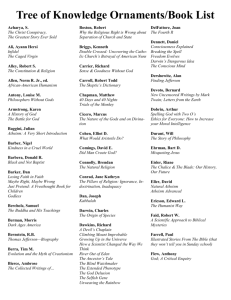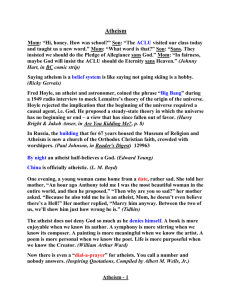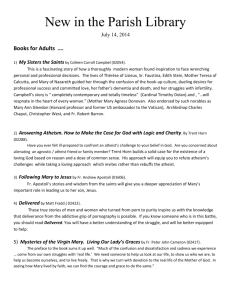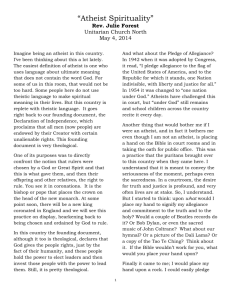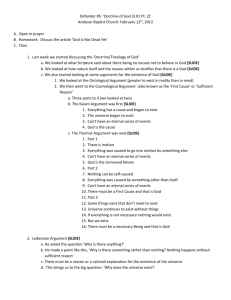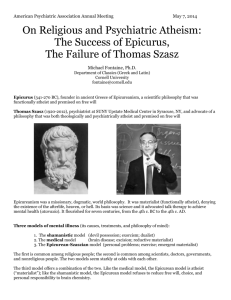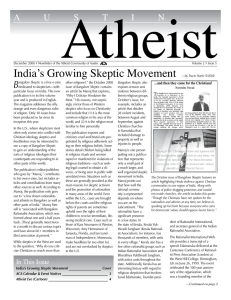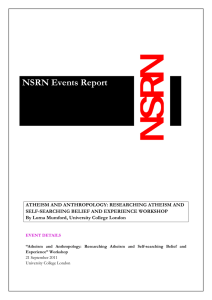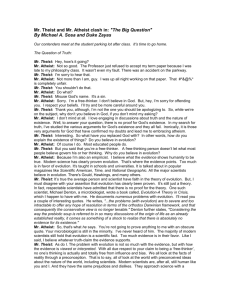Ctime466_atheist_polemics
advertisement
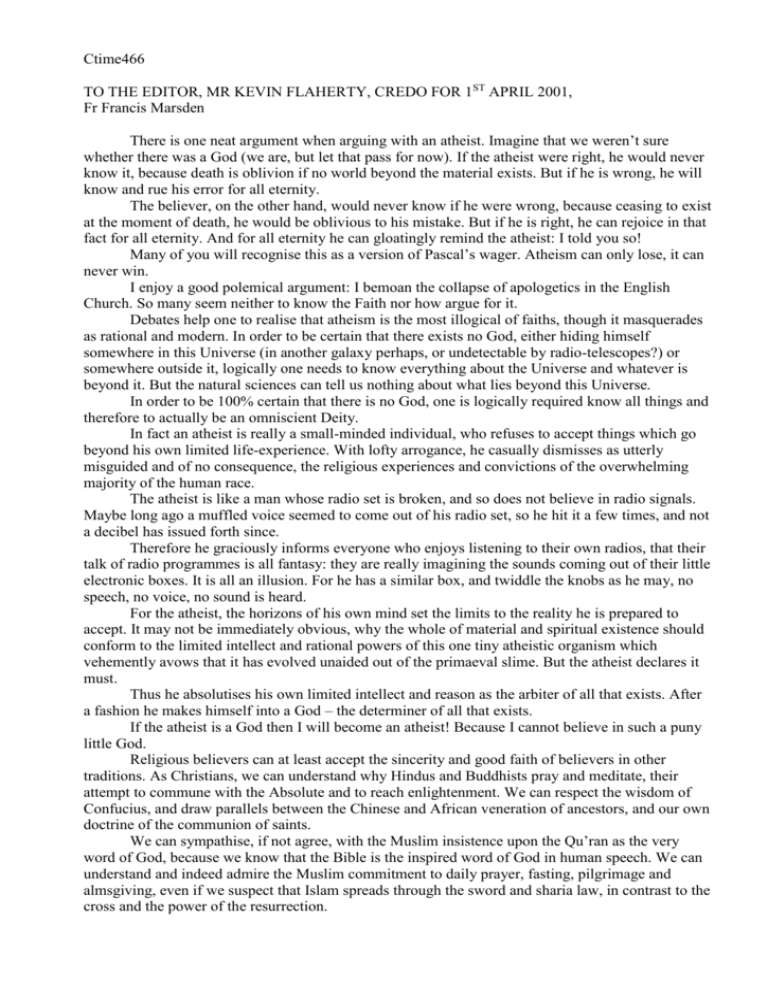
Ctime466 TO THE EDITOR, MR KEVIN FLAHERTY, CREDO FOR 1ST APRIL 2001, Fr Francis Marsden There is one neat argument when arguing with an atheist. Imagine that we weren’t sure whether there was a God (we are, but let that pass for now). If the atheist were right, he would never know it, because death is oblivion if no world beyond the material exists. But if he is wrong, he will know and rue his error for all eternity. The believer, on the other hand, would never know if he were wrong, because ceasing to exist at the moment of death, he would be oblivious to his mistake. But if he is right, he can rejoice in that fact for all eternity. And for all eternity he can gloatingly remind the atheist: I told you so! Many of you will recognise this as a version of Pascal’s wager. Atheism can only lose, it can never win. I enjoy a good polemical argument: I bemoan the collapse of apologetics in the English Church. So many seem neither to know the Faith nor how argue for it. Debates help one to realise that atheism is the most illogical of faiths, though it masquerades as rational and modern. In order to be certain that there exists no God, either hiding himself somewhere in this Universe (in another galaxy perhaps, or undetectable by radio-telescopes?) or somewhere outside it, logically one needs to know everything about the Universe and whatever is beyond it. But the natural sciences can tell us nothing about what lies beyond this Universe. In order to be 100% certain that there is no God, one is logically required know all things and therefore to actually be an omniscient Deity. In fact an atheist is really a small-minded individual, who refuses to accept things which go beyond his own limited life-experience. With lofty arrogance, he casually dismisses as utterly misguided and of no consequence, the religious experiences and convictions of the overwhelming majority of the human race. The atheist is like a man whose radio set is broken, and so does not believe in radio signals. Maybe long ago a muffled voice seemed to come out of his radio set, so he hit it a few times, and not a decibel has issued forth since. Therefore he graciously informs everyone who enjoys listening to their own radios, that their talk of radio programmes is all fantasy: they are really imagining the sounds coming out of their little electronic boxes. It is all an illusion. For he has a similar box, and twiddle the knobs as he may, no speech, no voice, no sound is heard. For the atheist, the horizons of his own mind set the limits to the reality he is prepared to accept. It may not be immediately obvious, why the whole of material and spiritual existence should conform to the limited intellect and rational powers of this one tiny atheistic organism which vehemently avows that it has evolved unaided out of the primaeval slime. But the atheist declares it must. Thus he absolutises his own limited intellect and reason as the arbiter of all that exists. After a fashion he makes himself into a God – the determiner of all that exists. If the atheist is a God then I will become an atheist! Because I cannot believe in such a puny little God. Religious believers can at least accept the sincerity and good faith of believers in other traditions. As Christians, we can understand why Hindus and Buddhists pray and meditate, their attempt to commune with the Absolute and to reach enlightenment. We can respect the wisdom of Confucius, and draw parallels between the Chinese and African veneration of ancestors, and our own doctrine of the communion of saints. We can sympathise, if not agree, with the Muslim insistence upon the Qu’ran as the very word of God, because we know that the Bible is the inspired word of God in human speech. We can understand and indeed admire the Muslim commitment to daily prayer, fasting, pilgrimage and almsgiving, even if we suspect that Islam spreads through the sword and sharia law, in contrast to the cross and the power of the resurrection. As Christians we are bound to have great respect and love for our ancestors in faith, the Jewish people, whose Scriptures we revere as our own, and who have so much to teach us about our own inheritance. Even in animism and the pagan religions we can see the natural human thirst for and openness to the supernatural. Although we fear that it is deceitful spirits who sometimes have led seekers astray. But the atheist is blind to the spiritual universe, and dismisses all world religions as darkest ignorance. Ironically, the atheist who insists upon the truth of his atheism implicitly contradicts himself, because he believes Truth is important. For if we have all evolved from a chemical swamp by blind evolution, what can thought be but the random collisions of molecules in the brain? And what is Truth but a more comfortable configuration of those molecules which suits a particular organism? Truth is only biochemistry! But the atheist who vigorously asserts the truth of his abstract creed, is in fact indirectly asserting non-material reality – Truth, mind, spirit. By his very vehemence he implies a greater Truth which can be rooted only in a Creator. Atheists, to be consistent, might like go and live in Albania: after all, that was the first officially proclaimed atheist state in the world- under Enver Hoxha a veritable paradise of unbelief and freedom. Or let them try North Korea, under the beloved leader Kim Chong Il, where they could starve to death in solidarity with other millions enjoying the full benefits of communist atheism. Twenty centuries of Christianity have produced great civilisations, a rich literature and culture, medicine and science. Nevertheless the record shows many blemishes when Christians have contradicted the tenets of their own faith: the abuses of the Crusades, the Inquisition’s execution of about 3000 people in 150 years, the religious wars which swept Europe after the tragically divisive Reformation, the massacre of Huguenots on St Bartholemew’s Eve (instigated by that nasty piece of work Catherine de Medici), the hysterical witch-hunts of the 17th century, the harshness of Spanish colonists towards the native Indians. Nevertheless these crimes pale compared to the achievements of atheist rulers in the 20th century: the death toll of between 85 and 100 millions victims of atheistic communism over 70 years – the gulags, the purges, the repressions and famines. And lest we forget, the atheistic curse of abortion, legalised by Lenin in 1920, and now adopted by the materialistic west, has devoured millions more innocent victims. What a great reckoning there will be at the Last Judgement! Compared to the atheistic regimes of the USSR, China, eastern Europe and Indo-China, the Christian nations were lily-white. Propagators of atheism must be reminded that they are bedfellows with Stalin, Mao-tse-Tung, Pol Pot and Nicolai Ceaucescu. The God-haters of the BBC, the Guardian and Parliament may protest, but they do not scruple to classify us Christians along with Pizarro and Torquemada, and even Hitler, though he repudiated Christianity. When the atheist denies the Fatherhood of God, he soon afterwards rejects the brotherhood of man. Refusing to revere God-made-man in Christ, he rapidly grows blind to the divine image in his fellow human beings. St Paul offers us today a higher wisdom: “Indeed I count everything as loss on account of the excellency of knowing Christ Jesus my Lord. For His sake I have suffered the loss of all things, and I look on everything as so much dung/garbage, in order that I may gain Christ and be found in Him…..that I may know Him and the power of His resurrection, and may share His sufferings, being conformed to Him in death, that if possible I may attain the resurrection from the dead.” (Philippians 3:8-14) In today’s Gospel Jesus offers a mercy to the woman caught in adultery (John 8:1-11), as indeed He offers great mercy to us all. Here is the realm of spiritual reality far more vivid than all this world has to offer, beautiful though it be.

